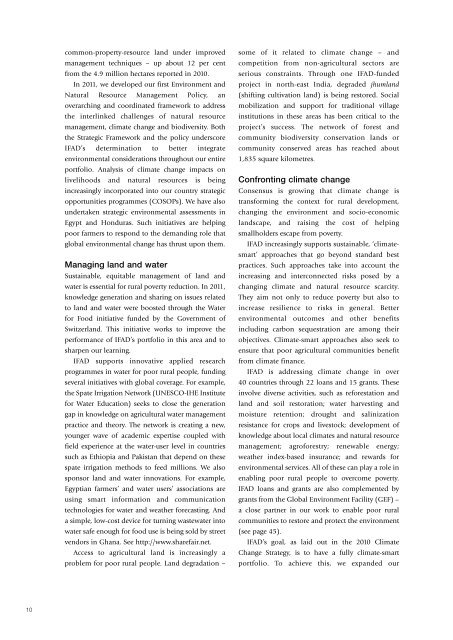ANNUAL REPORT 2011 - IFAD
ANNUAL REPORT 2011 - IFAD
ANNUAL REPORT 2011 - IFAD
You also want an ePaper? Increase the reach of your titles
YUMPU automatically turns print PDFs into web optimized ePapers that Google loves.
10<br />
common-property-resource land under improved<br />
management techniques – up about 12 per cent<br />
from the 4.9 million hectares reported in 2010.<br />
In <strong>2011</strong>, we developed our first Environment and<br />
Natural Resource Management Policy, an<br />
overarching and coordinated framework to address<br />
the interlinked challenges of natural resource<br />
management, climate change and biodiversity. Both<br />
the Strategic Framework and the policy underscore<br />
<strong>IFAD</strong>’s determination to better integrate<br />
environmental considerations throughout our entire<br />
portfolio. Analysis of climate change impacts on<br />
livelihoods and natural resources is being<br />
increasingly incorporated into our country strategic<br />
opportunities programmes (COSOPs). We have also<br />
undertaken strategic environmental assessments in<br />
Egypt and Honduras. Such initiatives are helping<br />
poor farmers to respond to the demanding role that<br />
global environmental change has thrust upon them.<br />
Managing land and water<br />
Sustainable, equitable management of land and<br />
water is essential for rural poverty reduction. In <strong>2011</strong>,<br />
knowledge generation and sharing on issues related<br />
to land and water were boosted through the Water<br />
for Food initiative funded by the Government of<br />
Switzerland. This initiative works to improve the<br />
performance of <strong>IFAD</strong>’s portfolio in this area and to<br />
sharpen our learning.<br />
<strong>IFAD</strong> supports innovative applied research<br />
programmes in water for poor rural people, funding<br />
several initiatives with global coverage. For example,<br />
the Spate Irrigation Network (UNESCO-IHE Institute<br />
for Water Education) seeks to close the generation<br />
gap in knowledge on agricultural water management<br />
practice and theory. The network is creating a new,<br />
younger wave of academic expertise coupled with<br />
field experience at the water-user level in countries<br />
such as Ethiopia and Pakistan that depend on these<br />
spate irrigation methods to feed millions. We also<br />
sponsor land and water innovations. For example,<br />
Egyptian farmers’ and water users’ associations are<br />
using smart information and communication<br />
technologies for water and weather forecasting. And<br />
a simple, low-cost device for turning wastewater into<br />
water safe enough for food use is being sold by street<br />
vendors in Ghana. See http://www.sharefair.net.<br />
Access to agricultural land is increasingly a<br />
problem for poor rural people. Land degradation −<br />
some of it related to climate change − and<br />
competition from non-agricultural sectors are<br />
serious constraints. Through one <strong>IFAD</strong>-funded<br />
project in north-east India, degraded jhumland<br />
(shifting cultivation land) is being restored. Social<br />
mobilization and support for traditional village<br />
institutions in these areas has been critical to the<br />
project’s success. The network of forest and<br />
community biodiversity conservation lands or<br />
community conserved areas has reached about<br />
1,835 square kilometres.<br />
Confronting climate change<br />
Consensus is growing that climate change is<br />
transforming the context for rural development,<br />
changing the environment and socio-economic<br />
landscape, and raising the cost of helping<br />
smallholders escape from poverty.<br />
<strong>IFAD</strong> increasingly supports sustainable, ‘climatesmart’<br />
approaches that go beyond standard best<br />
practices. Such approaches take into account the<br />
increasing and interconnected risks posed by a<br />
changing climate and natural resource scarcity.<br />
They aim not only to reduce poverty but also to<br />
increase resilience to risks in general. Better<br />
environmental outcomes and other benefits<br />
including carbon sequestration are among their<br />
objectives. Climate-smart approaches also seek to<br />
ensure that poor agricultural communities benefit<br />
from climate finance.<br />
<strong>IFAD</strong> is addressing climate change in over<br />
40 countries through 22 loans and 15 grants. These<br />
involve diverse activities, such as reforestation and<br />
land and soil restoration; water harvesting and<br />
moisture retention; drought and salinization<br />
resistance for crops and livestock; development of<br />
knowledge about local climates and natural resource<br />
management; agroforestry; renewable energy;<br />
weather index-based insurance; and rewards for<br />
environmental services. All of these can play a role in<br />
enabling poor rural people to overcome poverty.<br />
<strong>IFAD</strong> loans and grants are also complemented by<br />
grants from the Global Environment Facility (GEF) –<br />
a close partner in our work to enable poor rural<br />
communities to restore and protect the environment<br />
(see page 45).<br />
<strong>IFAD</strong>’s goal, as laid out in the 2010 Climate<br />
Change Strategy, is to have a fully climate-smart<br />
portfolio. To achieve this, we expanded our

















